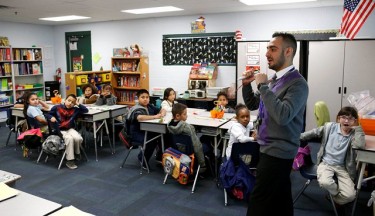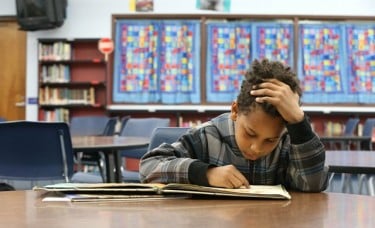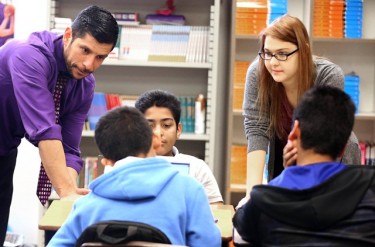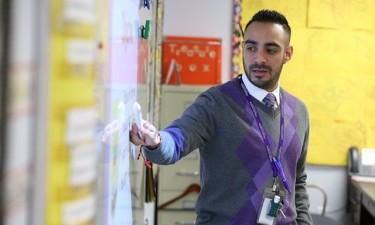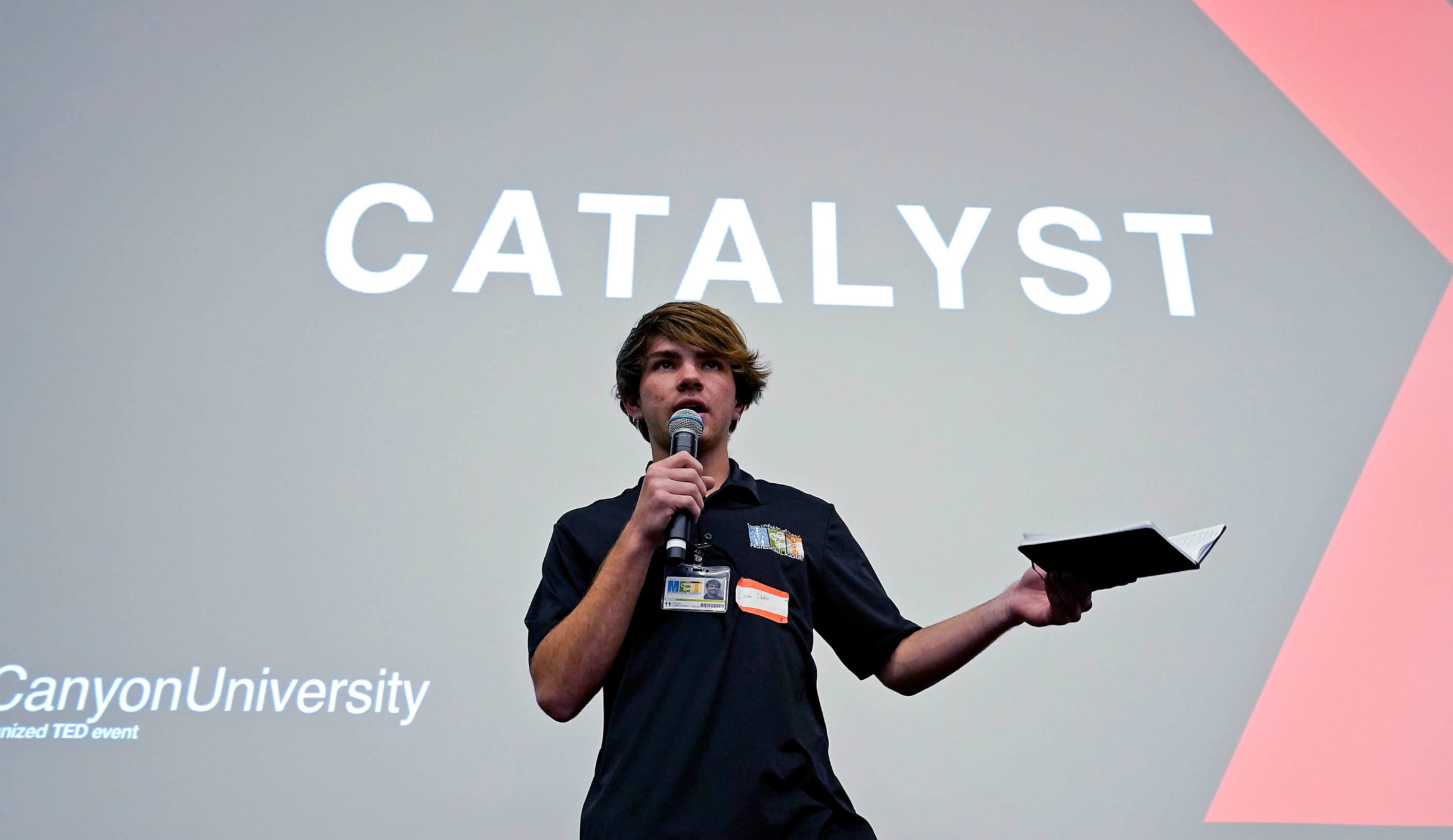Story by Michael Ferraresi
Photos by Darryl Webb
GCU Today Magazine
As his second graders sat cross-legged in front of a colorful interactive assignment board, Anthony Pérez cautiously monitored the lesson. His eyes darted from student to student to examine their varying responses. This time, though, he wasn’t the teacher.
A girl in a pink hoodie held that title for the moment, at the request of “Mr. Pérez.” It was her turn to lead her Sunset Elementary peers — kids in braids, camouflage fleece jackets and well-worn sneakers — through multiple exercises in the cinder block room. She directed the class with a cartoonish rubber finger.
Pérez learned early that this method allows students to feel what it’s like to guide their own classmates to the correct answers and digest the material with ease. The 32-year-old Grand Canyon University alumnus and west Phoenix native grew up on the same side of town as his students — many who come from immigrant families and low-income homes and are part of a district with a higher than average number of children who qualify for free or reduced-cost lunch.
In Arizona, a statewide teacher shortage, struggles with funding for public schools, and a low national rank for overall quality of education have left universities looking for innovative solutions. One example is the GCU College of Education’s partnership with the Rodel Foundation of Arizona to refocus the futures of children by developing more teachers with the heart to help. Pérez is a Rodel graduate who sees those challenges as an opportunity to serve his community.
Like many elementary school teachers, Pérez is required to bounce between math and vocabulary lessons, following carefully crafted schedules to keep the class on track. His strategy stems from what he learned during his Rodel assignment. At one point, he shouted, “CLASS, CLASS!” and a cacophony of well-trained student voices replied, “YES, YES!” The brief din of antsy conversation was quieted.
“I love how you followed the expectation, put everything away and that it was done quietly,” Pérez said in an even tone that washed over his Phoenix classroom.
So much of Pérez’s routine is patterned after his Rodel Exemplary Teacher mentor, Raquel Mendoza, whose second-grade classroom at Glenn F. Burton Elementary in Glendale was his final checkpoint to becoming a professional teacher. Like Mendoza and other mentors who have dedicated their lives to public school children, Pérez believes the future of public schools in his native state is as bright as a student’s face when — after all the patient, repetitive coaching — the proverbial light bulb is flicked on.
After coming to GCU to earn a master’s degree in elementary education, Pérez quickly emerged as a leader among his peers and accelerated his career through the 16-week Rodel placement. The program is intended to immerse future teachers in settings designed to overcome challenges facing underperforming schools.
Back at the interactive learning board, known as “Number Corner,” Pérez guided the class through math, money, time-telling and basic geometry, using displays with coins in plastic holders, clocks with adjustable hands and charts to help the students understand material on which they will be tested.
“When I was a kid, I was thrown into the classroom, sink or swim,” said Pérez, whose working-class parents spoke Spanish in their home. He picked up English in school and watched his mother struggle to understand his teachers during after-school conferences.
“Teachers have more tools at their fingertips now in the classroom,” Pérez said. “To me, it’s rewarding, especially with the changes going on in education. When I was in high school, they were barely phasing out typewriters and introducing computers. That’s how I learned keyboarding. There were no smart boards.”
Some of Pérez’s students still read at the kindergarten level. Others have improved their reading skills more quickly. When he joined the Cartwright School District and accepted the job at Sunset, five miles west of GCU, Pérez knew he’d have to juggle a wide range of needs in the class. Special ed teachers and reading and math specialists come in and out most of the day, diverting students to other rooms for extra help on speech or reading when schedules allow.
Solutions for a teacher shortage
Dr. Marjaneh Gilpatrick, GCU’s executive director of educational outreach, said Pérez — a graduate student at the time — approached her in 2009 to suggest that GCU partner with Rodel, since the College of Education’s conceptual framework and mission and that of the foundation aligned so well. With support from the dean and GCU’s executives, she established the partnership.
“It’s expected of them as student teachers that, when they become part of the Rodel program, they’re committing to a full, semesterlong job interview,” said Gilpatrick, who is responsible for recruiting, interviewing and sometimes supervising the Promising Student Teachers, a program that prepares GCU students to be placed in Arizona classrooms.
“This is their responsibility, their job … and they’re representing GCU,” she said. “They learn what a professional teacher looks like — how they’re in their classrooms before the students arrive, how they’re prepared, how they’re good colleagues and how they interact with parents.”
The student teacher is exposed to a high-needs environment by working closely with a mentor who has been recognized for success in that classroom. This semester, the College of Education placed three Promising Student Teachers through the Rodel program.
Dr. Kimberly LaPrade, dean of the College of Education, said the University places more than 100 ground campus students into student teaching assignments each year. Additional students are placed each semester into local schools to meet their field experience assignments, such as shadowing and interviewing of teachers.
“This (fall) semester, any student who wanted a job had a job,” LaPrade said. “There’s such a shortage in Arizona, there are more than 700 classrooms that do not have highly effective, certified teachers.”
Last year, the Arizona Department of Education reported the state had about 95,000 certified teachers, though only about 52,000 were teaching. Experts cited factors such as low entry-level salaries and lack of professional development opportunities.
“You have to love kids, love what you do and want to make a difference in the lives of kids,” said GCU alumnus Dr. Randy Watkins, a former Rodel Exemplary Principal who is assistant superintendent in the Buckeye Elementary School District. “(GCU) instilled that in me. I remember by Year Two I couldn’t wait for my student teaching experience.”
Education reform has come in a variety of measures. While the state has its mandates and successes, private organizations such as Rodel have helped plug some of the gaps with resources for seasoned educators, classroom math training programs and the frequent placement of student teachers.
Rodel’s charitable foundation was established more than 15 years ago with the goal of developing more Arizona educational leaders to strengthen public schools and improve student outcomes amid budget cuts. Schools qualify to receive teachers and other resources from Rodel if 70 percent or more of their students are part of free or reduced-cost lunch programs.
“GCU students could easily go to any school, Christian schools or wealthier areas to serve their communities as teachers,” said Howard Paley, the Rodel Foundation’s chief operating officer, who also serves on GCU’s Education Advisory Board. “But what I’ve learned is that Grand Canyon reaches out to all students, including high-needs students. The University wants to support them all.”
Rodel is just one example of how students shape their professionalism and passion for teaching children. While there’s a lot more handholding at the start of a semester, LaPrade said, the mentor teacher eventually loosens control and allows the student to lead.
“So the goal for the second half of the semester,” she said, “is to let the student really fly along to the point where they’re doing the planning, the grading — they’re managing the classroom.”
Stirring the underachievers
The sixth graders in Jorge Ontiveros’ class at Palomino Intermediate School make up the bottom 25 percent of their grade’s academic performance. Many of the students are still learning to read at their own grade level, and some have Individualized Education Programs, or IEPs.
“I should hear talking. My room shouldn’t be quiet,” Ontiveros warned the class, firmly yet compassionately, while presenting an assignment on the roots of Hinduism, part of a world religions unit.
Palomino and its neighboring elementary school are nestled between one of the newest Boys and Girls Clubs in the Valley and a park once threatened by gangs and drugs. But neighborhood partnerships with the police and other stakeholders have helped improve the overall quality of life in the square-mile Palomino area, known in north Phoenix as “the Square.” The schools have played a major role.
Ontiveros, a Rodel Exemplary Teacher who is working on a master’s degree in educational leadership from GCU, mentored GCU alumna Hannah Lasley during her Rodel Promising Student Teacher placement last fall.
The school’s Rodel Exemplary Principal, Jenny Robles, wanted to hire Lasley before she completed the program but had to settle for bringing her on board in December. The school had an opening in a fifth-grade class, and the principal was so sure of Lasley’s poise that she had her start immediately.
This semester, Ontiveros is mentoring GCU senior Emily Wagner. She and two other seniors, Reyannin Haggard and Jessica Wood, make up the current Rodel Promising Student Teacher class.
Wagner, 22, experienced many firsts in her first few weeks at Palomino. She recently met for the first time with a parent about a critical issue with a student.
“It made me remember why I wanted to teach in the first place,” she said.
During the Hinduism assignment, Wagner floated among groups of students, stopping once to define pilgrimage. “It’s like a religious journey,” she told the students and showed them how to search online for the foundational values of the Hindu faith, as they had for Judaism and other faiths earlier. Wagner encountered resistance but eventually had them willing to follow directions.
“Once they get it, their whole attitude changes and they’re completely different people for the rest of the day,” she said, recalling one moment when a girl in the class connected with the material and spent the rest of the day grinning ear to ear.
Wagner has learned that Ontiveros tries to make her feel comfortable and allows her to make mistakes. For Ontiveros, it’s about infusing the student teachers with the confidence to “let them fail, let them try.”
“Whether it’s good or bad, we always reflect,” he said. “There’s always an opportunity to improve.”
‘Not just a job’
As Pérez high-fived a student during a recent class, his red prayer bracelet with a red cross slid down his wrist. He is constantly trying to boost their morale and give them recognition for doing well and honest criticism when they’re not.
“We want students who are going to be committed to the classroom, who want to be teachers,” said LaPrade, who came to GCU with an inner-city Phoenix teaching background. “I think our Christian heritage also gives us a leg up there because this is a way to live out our faith — to teach. It resonates as a calling or vocation, not just a job.”
The Rodel placement taught Pérez effectiveness and consistency. He worked directly with Mendoza, his mentor teacher, on specific methods to manage a class. Now he strategically pairs students and configures seating based on specific needs, as she taught him.
Pérez said he remembers Mendoza’s first words to him, something like, “Whatever fairy tale ideas you have, you will quickly learn the reality of what it takes to get these kids to be successful and ready.”
GCU helped him refine his classroom practices, but that even tone of voice that has made him successful with children was developed in a Rodel classroom, by observing Mendoza and practicing in her presence.
“I really credit a lot to GCU, to Rodel and especially to her,” Pérez said, adding that he also has been conditioned to be an encourager.
When his students need guidance, he considers his response more out of personal duty than doing a job. He’s unfailingly honest, as difficult as that can be with children who have had tough lives.
“I always put it back on the choices they make and remind them that they’re only here for one reason — to learn,” Pérez said. “That helps motivate them to meet my expectations and to succeed.”
—
Rodel's measure of success
GCU’s College of Education places well-trained student teachers across the U.S., but local efforts
are intensified through a partnership with the Rodel Foundation of Arizona. Initiatives include:
Exemplary Teacher Initiative
It began in 2004 as a way to recognize teachers in low-income communities who exceed expectations and
use limited resources to help students excel. Principals nominate top teachers, and Rodel confirms nominees by reviewing years of achievement records and other data.
The 2015 cohort of Exemplary Teachers included two GCU grads — Martha Daniels (Ruth Fisher Elementary, Tonopah) and Stephanie Lund (William C. Jack Elementary, Glendale). They are among 168 teachers statewide, including other GCU alumni, to earn the honor.
Promising Student Teacher Program
Since 2004, the Rodel Foundation has placed nearly 700 student teachers in Arizona schools. The 16-week placement in the classroom of a Rodel Exemplary Teacher, who serves as a mentor, occurs in the last semester of the undergraduate or master’s program. Student teachers earn a $1,000 waiver toward college tuition and a $5,000 award from the Rodel Foundation after completing the program and teaching in a qualifying school for three years after graduation.
GCU placed seven students in the program this year, although the College of Education has been approved to provide scholarships for up to 20 in the Rodel program in 2015-16 and beyond. Three GCU Rodel student teachers this spring are among 23 previously selected.
For more information, visit www.gcu.edu/College-of-Education or www.rodelaz.org.
—
K-12 problem-solving
GCU's innovative contributions to Arizona K-12 education include:
Learning Lounge
What began as a way for GCU students to tutor underprivileged or struggling students from neighboring
Alhambra High School has expanded to reach others. Of the 92 Alhambra students who passed Arizona’s Instrument to Measure Standards (AIMS test) this fall, about 40 had studied with GCU tutors at the Learning Lounge. The sessions increased their confidence and focus going into the test, said Principal Claudio Coria.
STEM Scholars
As part of a White House national education summit in December, the University announced it has partnered with the Peoria Unified School District on a tuition-free program for high school students to earn college STEM credits. The goal is to extend the benefits to 650 students across 10 Valley school districts.
Lopes Leap to Teach
The College of Education initiative unveiled in October aims to link school districts with open positions to qualified student teachers and alumni. The University plans to continue hosting campus education job expos.
Policy paper
GCU visiting professor Dr. Gerald Tirozzi, a former assistant secretary of elementary and secondary
education at the U.S. Department of Education, published “Addressing a Shortage of High Quality Teachers: An Escalating Dilemma for Arizona Schools” in April 2014 through the College of Doctoral Studies. Tirozzi has provided a variety of commentary on the issue.

